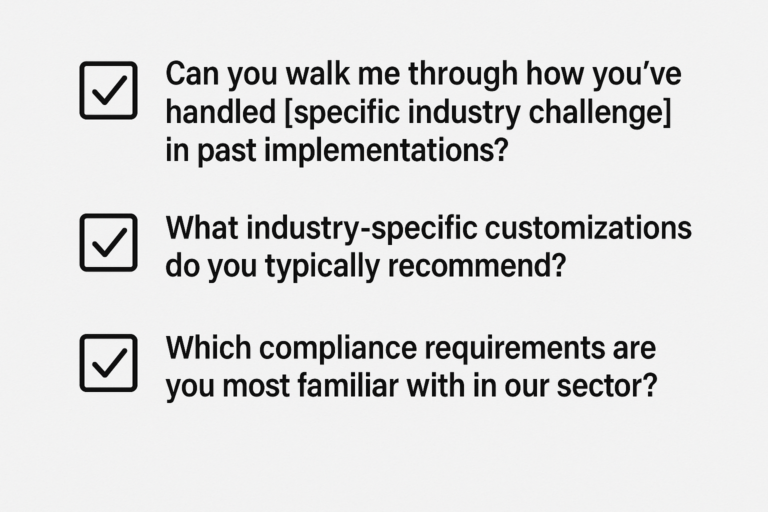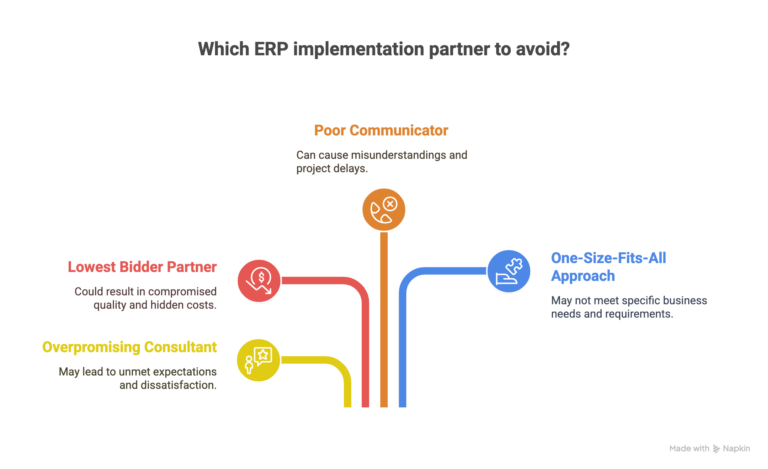Greetings! I'm Aneesh Sreedharan, CEO of 2Hats Logic Solutions. At 2Hats Logic Solutions, we are dedicated to providing technical expertise and resolving your concerns in the world of technology. Our blog page serves as a resource where we share insights and experiences, offering valuable perspectives on your queries.

Quick Summary
Use our 10-point framework to evaluate partners: industry experience, technical expertise, proven methodology, cultural fit, USA-based teams, post-implementation support, data migration skills, change management, transparent pricing, and solid references. Avoid overpromising consultants and the cheapest bidders. 2HatsLogic offers transparent, USA-based ERP implementation services with a proven track record.
So, you’ve finally decided to bite the bullet and implement an ERP system for your business. You’ve probably spent months (maybe years) dealing with disconnected systems, manual processes, and the constant headache of data living in a dozen different places. We get it – and you’re absolutely making the right move.
But here’s where things get tricky.
According to multiple industry studies show that ERP implementation failure rates can exceed 75% for first-time attempts. The difference between success and becoming another failure statistic? Choosing the right ERP implementation partner.
Your software choice matters, sure. But your implementation partner is the one who’ll guide you through the maze of customizations, data migration, user training, and go-live challenges. They’re either your greatest ally or your most expensive mistake.
TIP: Remember that you’re not just buying software, you’re investing in a long-term relationship that will impact your business operations for years to come.
What Happens When You Choose the Wrong ERP Implementation Partner?
Before we dive into the selection criteria, let’s talk about what’s at stake. The numbers are sobering:
- Budget overruns: 74.1% exceed budget
- Timeline delays: 61.1% of ERP projects take longer than expected
- Executive satisfaction: Only 28% of companies are satisfied with their ERP system
These aren’t just statistics; they represent real businesses that struggled with payroll processing for months, lost critical customer data, or couldn’t generate basic financial reports for quarters at a time.
The bottom line? The wrong implementation partner doesn’t just cost money. They can bring your entire operation to a grinding halt.
Don’t want to take that risk?
How to Choose the Best ERP Implementation Partner: 10-Point Framework
Use this comprehensive evaluation framework to identify implementation partners who will drive your project to success, not failure.
1. What Industry Experience Should Your ERP Partner Have?
A generic ERP experience isn’t enough. You need an implementation partner who understands the unique workflows, compliance requirements, and challenges of your specific industry.
What to look for:
- At least 3-5 successful implementations in your industry
- Understanding of industry-specific regulations (FDA, SOX, HIPAA, etc.)
- Familiarity with your standard business processes
- References from companies similar to your size and complexity
Questions to ask:

2. How to Verify ERP Implementation Consultant Technical Skills
Not all ERP implementation partners are created equal. Some excel with SAP, others with Microsoft Dynamics 365, NetSuite, or Oracle. You want specialists, not generalists.
Essential certifications to verify:
- Microsoft Dynamics: Solutions Partner status
- SAP: Gold Partner certification
- NetSuite: 5-Star Partner rating
- Oracle: Platinum Partner level
Beyond certifications, evaluate:
- Number of certified consultants on their team
- Ongoing training programs for their staff
- Recognition or awards from the ERP vendor
- Technical depth in areas like data integration and customization
3. What Makes ERP Implementation Services Methodology Effective?
Your ERP implementation partner should have a clear, documented methodology, not just a copy-paste version of the vendor’s standard approach.
Look for methodologies that include:
- Detailed discovery and requirements gathering phase
- Structured testing protocols
- Comprehensive change management planning
- Clear milestone definitions and deliverables
- Risk mitigation strategies
Warning signs:
- Vague or generic project plans
- Inability to explain their specific approach
- No documented lessons learned from previous projects
- Overly aggressive timelines without proper planning phases
| Implementation Phase | Key Deliverable | Typical Duration |
| Discovery & Planning | Requirements document | 2-4 weeks |
| System Configuration | Configured test environment | 4-8 weeks |
| Data Migration | Clean, validated data transfer | 2-4 weeks |
| Testing & Training | User acceptance testing completion | 3-6 weeks |
4. How to Assess Cultural Fit with Your ERP Partner
ERP implementations are marathon projects, not sprints. You’ll be working closely with your implementation partner for months, potentially years. Cultural misalignment can derail even technically perfect projects.
Evaluate during the sales process:
- Do they listen more than they talk?
- Are they asking thoughtful questions about your business?
- How quickly do they respond to your communications?
- Do their values align with your company culture?
5. Why Choose USA-Based ERP Implementation Teams?
When you’re dealing with critical business systems, time zones and communication barriers can create serious problems. For USA-based businesses, having domestic implementation teams offers significant advantages:
Benefits of USA-based implementation partners:
- Real-time collaboration during business hours
- Understanding of American business practices and regulations
- No language or cultural barriers
- Easier on-site support when needed
- Compliance with US data protection requirements
Key questions:
- Where are your implementation consultants located?
- What are your support hours and response times?
- Do you have on-site capabilities if needed?
6. What ERP Support Services Do You Need After Go-Live?
The go-live date isn’t the finish line; it’s the starting gun. Your ERP system will need ongoing support, updates, and optimization long after the initial implementation.
Essential support services:
- Help desk with guaranteed response times
- Regular system health checks
- Software updates and patch management
- Additional user training as your team grows
- Strategic consulting for future enhancements
Red flags:
- Limited post-implementation support options
- Unclear support pricing or SLAs
- History of abandoning clients after go-live
- No long-term relationship focus
7. How to Ensure Smooth ERP System Data Migration and Integration
One of the most complex aspects of any ERP implementation is moving your existing data and integrating with other systems. This is where many projects fail spectacularly.
Critical capabilities:
- Experience with your current systems and databases
- Proven data cleansing and validation processes
- Integration expertise with common business applications
- Understanding of API capabilities and limitations
- Backup and rollback procedures
For businesses with e-commerce operations, ensure they have experience integrating with platforms like Shopify and Shopware.
8. Why is Change Management Critical for ERP Implementation Success?
The best ERP system in the world is worthless if your team doesn’t use it properly. Lack of stakeholder buy-in and insufficient change management are the most common reasons for ERP failure.
Look for partners who offer:
- Comprehensive user training programs
- Change management expertise
- Executive coaching for leadership buy-in
- Role-based training customization
- Post-go-live adoption monitoring
9. Financial Transparency from Your ERP Implementation Consultant
With average cost overruns reaching 33%, you need a partner who’s committed to staying within budget and being transparent about all potential costs.
Demand clarity on:
- Fixed-price vs. time-and-materials pricing
- What’s included vs. what costs extra
- Change order management processes
- Payment milestone structure
- Hidden fees for training, support, or customizations
TIP: Be wary of partners who quote significantly lower than others, they often make up the difference through change orders and scope creep.
10. ERP Partner References and Proven Track Record
Finally, don’t take anyone’s word for it. Demand references from recent, similar implementations and actually call them.
Questions to ask references:
- Did the project finish on time and on budget?
- How was their communication throughout the process?
- What would you do differently if you could start over?
- Are you still working with them for ongoing support?
- Would you recommend them to a peer?
USA-Specific Considerations for ERP Implementation Partners
American businesses face unique challenges that require specialized knowledge from their ERP implementation partners.
Regulatory Compliance Requirements
American businesses face unique regulatory challenges that your implementation partner must understand:
Key compliance areas:
- SOX compliance for public companies
- GDPR considerations for companies with EU customers
- Industry-specific regulations (HIPAA, FDA, DOT, etc.)
- State-level business requirements and tax considerations
- Labor law compliance for HR modules
Domestic vs. Offshore ERP Implementation Teams
While offshore teams can reduce costs, they often create challenges for USA-based businesses:
Potential offshore challenges:
- Time zone misalignment is affecting project velocity
- Cultural differences in business process understanding
- Communication barriers during critical project phases
- Limited understanding of US regulatory requirements
- Difficulty providing on-site support when needed
Local Market Understanding
Your implementation partner should understand the American business landscape, including:
- Regional business practices and preferences
- Common integration requirements with US-based software
- American accounting and financial reporting standards
- Local customer expectations and market dynamics
ERP Implementation Partner Red Flags to Avoid
Recognizing these warning signs early can save you from costly mistakes and project failures.

The Overpromising ERP Implementation Consultant
Partners who guarantee unrealistic timelines or promise to solve every business challenge with their ERP implementation. If it sounds too good to be true, it probably is.
The Lowest Bidder ERP Partner
ERP implementations are complex projects requiring skilled resources. Significantly low bids often indicate either inexperience or plans to increase costs through change orders.
The Poor Communicator
If they’re hard to reach, slow to respond, or unclear in their explanations during the sales process, imagine how frustrating the implementation will be.
The One-Size-Fits-All Approach
Every business is unique. Partners who propose identical solutions for different companies haven’t done their homework.
How 2HatsLogic Delivers Superior ERP Implementation Services
At 2HatsLogic, we’ve seen too many businesses struggle with failed implementations. That’s why we’ve built our entire approach around avoiding the common pitfalls that plague this industry.
Our differentiators:
- USA-based team with deep understanding of American business practices
- Industry-specific expertise tailored to your sector’s unique requirements
- Transparent pricing with no hidden fees or surprise costs
- Proven methodology refined through hundreds of successful implementations
- Long-term partnership focus extending well beyond go-live
We don’t just implement software, we transform businesses. Our goal is to ensure your ERP system becomes a competitive advantage, not a source of frustration.
We offer a free ERP readiness assessment.Ready to learn more?
Conclusion
Choosing the right ERP implementation partner isn’t a decision to rush. Take time to thoroughly evaluate potential partners using this framework:
- Create your evaluation criteria based on the 10 points above
- Request detailed proposals from 3-4 qualified partners
- Check references thoroughly, don’t skip this step
- Meet the actual implementation team you’ll be working with
- Understand the total cost including all potential extras
Remember, you’re not just buying an implementation service, you’re choosing a partner who will help transform your business operations. Choose wisely, and your ERP system will drive growth and efficiency for years to come.
Don’t let your business become another ERP failure statistic. Contact 2HatsLogic today for your free assessment and discover how we can help you achieve implementation success.
FAQ
What should I look for in an ERP implementation consultant?
Look for industry-specific experience, technical expertise with your chosen platform, proven methodology, strong references, and comprehensive post-implementation support. USA-based teams offer advantages for domestic businesses.
Why do so many ERP implementations fail?
Common failure causes include poor partner selection, inadequate planning, insufficient user training, scope creep, lack of executive support, unrealistic timelines, and poor communication between stakeholders.
How much does an ERP implementation partner cost?
ERP implementation costs vary significantly based on your company size, system complexity, customization requirements, and chosen platform. Factors that influence pricing include project scope, data migration complexity, integration needs, training requirements, and ongoing support levels.
How long does ERP implementation take with a partner?
Small businesses typically complete ERP implementations in 3-6 months, mid-sized companies need 6-12 months, and large enterprises require 12-24 months. Timeline depends on business complexity and scope of implementation.
Table of contents
- What Happens When You Choose the Wrong ERP Implementation Partner?
- How to Choose the Best ERP Implementation Partner: 10-Point Framework
- USA-Specific Considerations for ERP Implementation Partners
- ERP Implementation Partner Red Flags to Avoid
- How 2HatsLogic Delivers Superior ERP Implementation Services
- Conclusion

Related Articles







